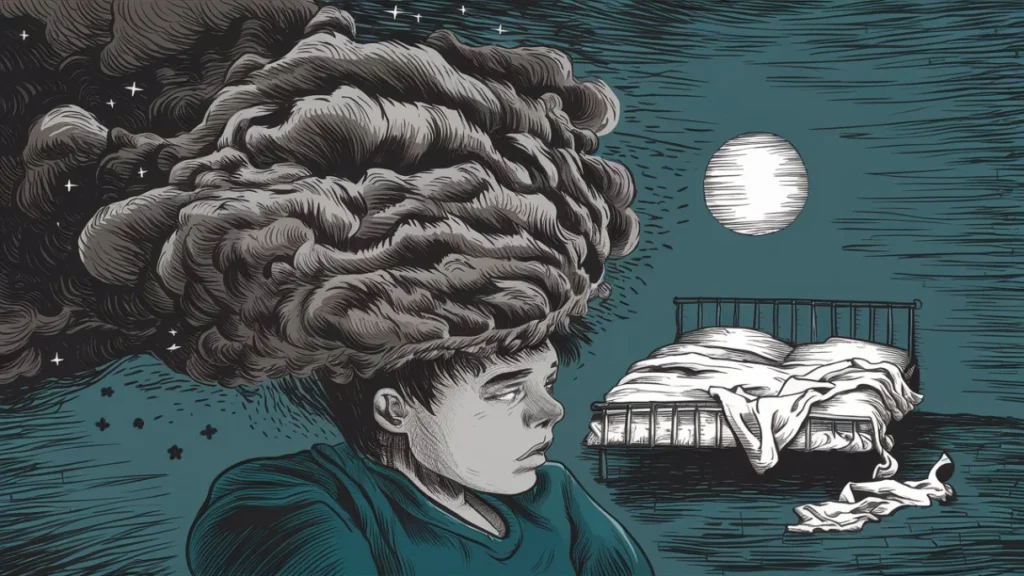We all know how important a good night’s sleep is for our overall health and well-being. But did you know that stress and trauma can have a significant impact on the quality of our sleep and the content of our dreams? In this article, we’ll explore the fascinating connection between stress, trauma, and our dream lives, and offer some practical tips for improving sleep quality and managing stress.
The Science of Sleep and Dreams
Before we dive into the impact of stress and trauma on sleep and dreams, let’s take a quick look at the science behind these vital processes. Sleep is a complex biological process that plays a crucial role in:
- Physical repair and restoration
- Cognitive function and memory consolidation
- Emotional regulation and processing
During sleep, our brains cycle through various stages, including:
- Non-Rapid Eye Movement (NREM) sleep, which includes:
- Stage 1: Light sleep, easily awakened
- Stage 2: Deeper sleep, body temperature drops, heart rate slows
- Stages 3 and 4: Slow-wave sleep, important for physical restoration and growth
- Rapid Eye Movement (REM) sleep, characterized by:
- Vivid dreaming
- Increased brain activity
- Temporary muscle paralysis
Dreams occur primarily during REM sleep, although they can happen in other stages as well. While the exact purpose of dreaming is still debated, many researchers believe that dreams play a role in:
- Emotional processing and regulation
- Memory consolidation and integration
- Problem-solving and creativity
Now that we have a basic understanding of sleep and dreams let’s explore how stress and trauma can affect these processes.
The Impact of Stress on Sleep and Dreams

Stress is a natural response to perceived threats or challenges, triggering the release of hormones like cortisol and adrenaline. While short-term stress can be beneficial, chronic stress can have a profound impact on our sleep and dream lives.
Some common effects of stress on sleep include:
- Difficulty falling asleep or staying asleep
- Increased nighttime awakenings
- Reduced sleep quality and duration
- Increased likelihood of sleep disorders like insomnia or sleep apnea
Stress can also affect the content and emotional tone of our dreams. Some common stress-related dream themes include:
- Being chased or attacked
- Falling or losing control
- Being unprepared for a test or important event
- Experiencing conflict or confrontation
While occasional stress-related dreams are normal, frequent or recurring nightmares can be a sign of more serious underlying issues, such as anxiety, depression, or post-traumatic stress disorder (PTSD).
The Impact of Trauma on Sleep and Dreams

Trauma, whether from a single event or ongoing exposure to stressful situations, can have a profound and lasting impact on our sleep and dream lives. Some common effects of trauma on sleep include:
- Insomnia or difficulty falling asleep
- Frequent nighttime awakenings
- Nightmares or recurring distressing dreams
- Sleep terrors or sleep paralysis
- Avoidance of sleep due to fear of nightmares
Trauma can also significantly alter the content and emotional tone of our dreams. Some common trauma-related dream themes include:
- Reliving the traumatic event or elements of the trauma
- Symbolic representations of the trauma or its aftermath
- Feelings of helplessness, fear, or vulnerability
- Themes of loss, grief, or abandonment
For individuals with PTSD, nightmares and distressing dreams can be a frequent and debilitating symptom, often leading to sleep avoidance and further exacerbating the condition.
Improving Sleep Quality and Managing Stress

If you’re struggling with stress or trauma-related sleep disturbances, there are several strategies you can try to improve your sleep quality and manage your stress levels:
- Establish a consistent sleep schedule
- Go to bed and wake up at the same time each day, even on weekends
- Create a relaxing bedtime routine to signal to your body that it’s time to sleep
- Create a sleep-friendly environment
- Keep your bedroom dark, quiet, and cool
- Use comfortable bedding and pillows
- Avoid electronic devices before bedtime, as the blue light can interfere with sleep
- Practice relaxation techniques
- Deep breathing exercises
- Progressive muscle relaxation
- Meditation or mindfulness practices
- Engage in regular physical activity
- Exercise can help reduce stress and improve sleep quality
- Aim for at least 30 minutes of moderate-intensity exercise most days of the week
- Avoid exercising too close to bedtime, as it may interfere with sleep
- Limit caffeine, alcohol, and nicotine intake
- These substances can interfere with sleep quality and duration
- Avoid consuming them in the hours leading up to bedtime
- Consider cognitive-behavioral therapy (CBT) for insomnia or nightmares
- CBT is a structured therapy that can help identify and change negative thought patterns and behaviors related to sleep
- It may include techniques like sleep restriction, stimulus control, and cognitive restructuring
- Seek professional help for trauma-related sleep disturbances
- If you’re experiencing frequent nightmares, sleep terrors, or other distressing symptoms related to trauma, it’s important to seek help from a mental health professional
- Therapy approaches like eye movement desensitization and reprocessing (EMDR) or trauma-focused CBT can be effective in treating trauma-related sleep disturbances
Resources and Further Reading
If you’re interested in learning more about the impact of stress and trauma on sleep and dreams, or if you’re seeking additional support, here are some helpful resources:
Remember, everyone’s experience with stress, trauma, and dreams is unique. What works for one person may not work for another. Be patient with yourself, and don’t hesitate to reach out for support when you need it. With time, self-care, and the right resources, it is possible to improve your sleep quality and find peace in your dream life.
Sweet dreams!
